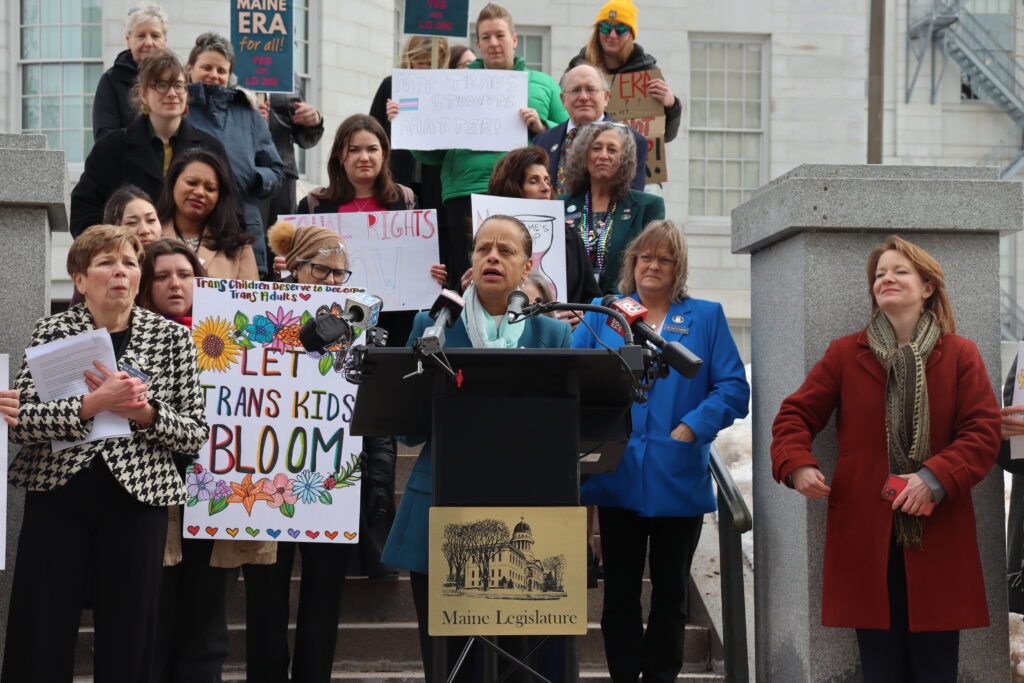Sen. Rachel Talbot Ross (D-Cumberland) rallies outside the State House to voice her support for the proposed Equal Rights Amendment to the Maine Constitution on March 4, 2025. (Photo by Emma Davis/ Maine Morning Star)
The latest attempt to add an Equal Rights Amendment to the Maine Constitution has all but failed, though a procedural move on Thursday technically leaves it in limbo until appropriations are settled at the end of session.
Constitutional amendments are ultimately decided by the voters but first need to receive the support of two-thirds of the Maine Legislature. On Wednesday, the House voted 74-65 to enact the measure, failing to meet that threshold.
The reason Republicans were opposed: gender identity.
“The question before us is not whether equality matters,” Rep. Jennifer Poirier (R-Skowhegan) said on the House floor on April 17. “It’s whether this amendment helps or harms that cause, and I submit that it does more harm than good.”
The proposed amendment would prohibit “the denial or abridgment by the state or any political subdivision of the state of equal rights based on the actual or perceived race, color, religion, sex, sexual orientation, gender identity, gender expression, age, physical or mental disability, ancestry or national origin of an individual.”
Echoing prominent opposition to the federal Equal Rights Amendment in the 1970s, several of the Republicans who voted against the measure claimed it was a threat to women’s rights because of the protections it would afford against discrimination based on gender identity, which is a protected class under the Maine Human Rights Act.
Gender identity has become a major flashpoint in Maine since President Donald Trump threatened to withhold federal funding unless the state complies with his executive order banning transgender girls from playing in girls’ sports.
The state is currently being sued by the Department of Justice and has been the subject of several probes and funding cuts that have been widely interpreted as retaliatory. The Legislature is also considering a few individual bills to restrict transgender students’ access to sports, bathrooms and locker rooms.
Despite this new context, state efforts to pass an ERA are longstanding.
LD 260, proposed by Rep. Holly Sargent (D-York) and more than 90 Democratic and independent co-sponsors, continues the work of the late state Rep. Lois Galgay Reckitt, who pressed for a state ERA for five decades, with the last attempt failing to pass in 2023 during her final term in the Maine Legislature.
On the House floor on April 17, Sargent argued constitutions are not static documents.
“Our Constitution began with a narrow vision of to whom equal rights were given,” Sargent said. “But our national and state constitutions are living evolving and expanding pronouncements of what Americans believe throughout our history. Our constitutions have gradually redefined who is worthy of all of the rights to be bestowed and who can be excluded, who is viewed as less than human.”
Lawmakers are not considering with this bill whether to enshrine rights in the Constitution, said Rep. Amy Roeder (D-Bangor), but rather whether to let the voters decide.
“I, for one, am not afraid of the will of the people,” Roeder said, “and I hope the rest of this body will join me in that.”
The Democratic majority in the lower chamber did. But instead of casting an enactment vote on Thursday, the Senate sent the legislation to the “Appropriations Table.” This is typical for constitutional amendments, as they will have fiscal notes associated with election costs.
If bills aren’t explicitly funded in the state budget, they need to be paid for using remaining unappropriated money, which is divided up usually near the end of session when the Appropriations and Financial Affairs Committee “runs the table.”
While bills placed on the table can still pass, precedent shows that most will die, left on the table without final action by the time the Legislature adjourns. Regardless, initial votes in both chambers and the enactment vote in the House signal the two-thirds threshold will not be reached even if appropriators do eventually decide to take it off the table.
SUPPORT: YOU MAKE OUR WORK POSSIBLE
Read the full article here


